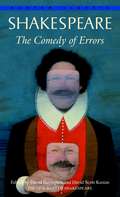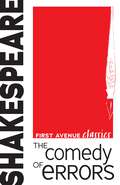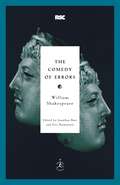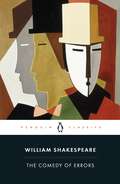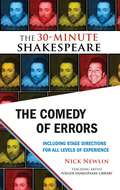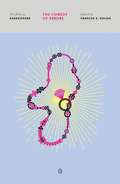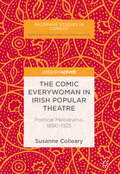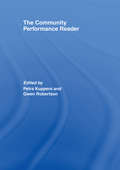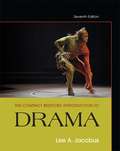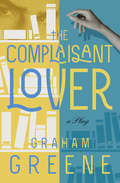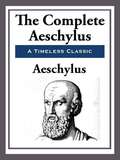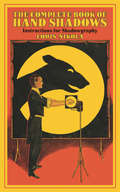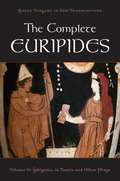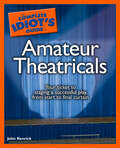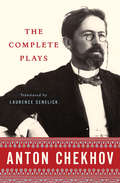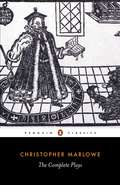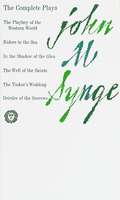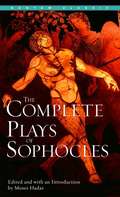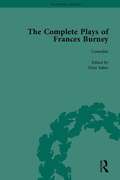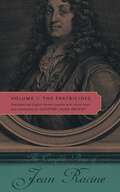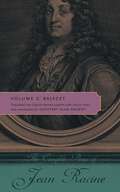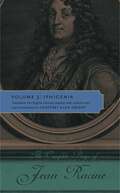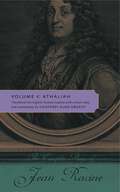- Table View
- List View
The Comedy of Errors
by William ShakespeareBook Description The shortest and probably earliest of Shakespeare's comedies, The Comedy of Errors is the story of identical twin brothers who are raised apart-and then mistaken for each other.
The Comedy of Errors (First Avenue Classics ™)
by William ShakespeareThe merchant Egeon is caught crossing the border from Syracuse into the rival city of Ephesus—a crime punishable by death. But Egeon isn't a criminal; he's merely trying to find his wife and one of his twin sons, who were separated from him after a shipwreck twenty-five years ago. The Duke takes pity on Egeon after hearing his story and grants him a day to raise the money necessary to save his life. What Egeon isn't aware of is that both of his twin sons are now in Ephesus, and with two identical sons in one city, strange mix-ups are bound to happen. A tale of mistaken identities, this unabridged version of one of English playwright William Shakespeare's earliest comedic plays was first performed in 1594 and published in Shakespeare's First Folio in 1623.
The Comedy of Errors (The New Cambridge Shakespeare)
by William Shakespeare T. S. DorschRos King provides a completely new Introduction to the existing text and commentary for this updated edition of The Comedy of Errors. She argues that the play cannot be regarded only as a farcical romp based on a classical model, but should be considered part of a critically misunderstood genre of tragi-comedy. Stressing the play's underlying seriousness, the Introduction pays special attention to its religious imagery.
The Comedy of Errors: A Comedy In Five Acts (classic Reprint) (Modern Library Classics)
by William ShakespeareThis is an EXACT reproduction of a book published before 1923. This IS NOT an OCR'd book with strange characters, introduced typographical errors, and jumbled words. This book may have occasional imperfections such as missing or blurred pages, poor pictures, errant marks, etc. that were either part of the original artifact, or were introduced by the scanning process. We believe this work is culturally important, and despite the imperfections, have elected to bring it back into print as part of our continuing commitment to the preservation of printed works worldwide. We appreciate your understanding of the imperfections in the preservation process, and hope you enjoy this valuable book.
The Comedy of Errors: Critical Essays
by William Shakespeare'After God, Shakespeare has created most' Alexandre DumasTwo sets of identical twins, separated at sea as babies, find themselves in the same city for the first time as adults. Soon, their friends mistake the twins for one another and bewilderment abounds. Joyful, mystical and brilliantly farcical, Shakespeare's shortest play is an early romantic comedy of confusion and ultimate reunion.Used and Recommended by the National TheatreGeneral Editor Stanley WellsEdited by Stanley WellsIntroduction by Randall Martin
The Comedy of Errors: The 30-Minute Shakespeare
by Nick NewlinThe Comedy of Errors: The 30-Minute Shakespeare offers five raucous scenes from this extravaganza of mistaken identity.The abridgement begins with a dramatic physical enactment of the twins' separation at sea. The play continues with a series of foibles featuring Antipholus of Ephesus, Dromio of Ephesus, and their identical twin counterparts from Antipholus.Adriana and Luciana receive hysterically misguided attention from the twins. Emilia and Egeon as the long-lost parents, and the riotous conjurer Dr. Pinch round out the cast of characters in Shakespeare's most uproarious comedy.The edition includes a preface by Nick Newlin containing helpful advice on how to put on a Shakespeare performance in a high school class with novice actors, as well as an appendix with suggestions for the specific play and recommendations for further resources.
The Comedy of Errors: Webster's Italian Thesaurus Edition (The Pelican Shakespeare)
by William Shakespeare Stephen Orgel A. R. Braunmuller Frances E. DolanThe acclaimed Pelican Shakespeare series edited by A. R. Braunmuller and Stephen Orgel The legendary Pelican Shakespeare series features authoritative and meticulously researched texts paired with scholarship by renowned Shakespeareans. Each book includes an essay on the theatrical world of Shakespeare’s time, an introduction to the individual play, and a detailed note on the text used. Updated by general editors Stephen Orgel and A. R. Braunmuller, these easy-to-read editions incorporate over thirty years of Shakespeare scholarship undertaken since the original series, edited by Alfred Harbage, appeared between 1956 and 1967. With definitive texts and illuminating essays, the Pelican Shakespeare will remain a valued resource for students, teachers, and theater professionals for many years to come. For more than seventy years, Penguin has been the leading publisher of classic literature in the English-speaking world. With more than 1,800 titles, Penguin Classics represents a global bookshelf of the best works throughout history and across genres and disciplines. Readers trust the series to provide authoritative texts enhanced by introductions and notes by distinguished scholars and contemporary authors, as well as up-to-date translations by award-winning translators.
The Comic Everywoman in Irish Popular Theatre: Political Melodrama, 1890-1925 (Palgrave Studies in Comedy)
by Susanne CollearyThis book is a comprehensive study of comic women in performance as Irish Political Melodrama from 1890 to 1925. It maps out the performance contexts of the period, such as Irish “poor” theatre both reflecting and complicating narratives of Irish Identity under British Rule. The study investigates the melodramatic aesthetic within these contexts and goes on to analyse a selection of the melodramas by the playwrights J.W. Whitbread and P.J. Bourke. In doing so, the analyses makes plain the comic structures and intent that work across both character and action, foregrounding comic women at the centre of the discussion. Finally, the book applies a “practice as research” dimension to the study. Working through a series of workshops, rehearsals and a final performance, Colleary investigates comic identity and female performance through a feminist revisionist lens. She ultimately argues that the formulation of the Comic Everywoman as staged “Comic” identity can connect beyond the theatre to her “Everyday” self. This book is intended for those interested in theatre histories, comic women and in popular performance.
The Community Performance Reader
by Petra Kuppers Gwen RobertsonCommunity Performance: A Reader is the first book to provide comprehensive teaching materials for this significant part of the theatre studies curriculum. It brings together core writings and critical approaches to community performance work, presenting practices in the UK, USA, Australia and beyond. Offering a comprehensive anthology of key writings in the vibrant field of community performance, spanning dance, theatre and visual practices, this Reader uniquely combines classic writings from major theorists and practitioners such as Augusto Boal, Paolo Freire, Dwight Conquergood and Jan Cohen Cruz, with newly commissioned essays that bring the anthology right up to date with current practice. This book can be used as a stand-alone text, or together with its companion volume, Community Performance: An Introduction, to offer an accessible and classroom-friendly introduction to the field of community performance.
The Compact Bedford Introduction to Drama (7th Edition)
by Lee A. JacobusOffering a carefully chosen selection of plays from the ancient Greeks to the present--including many new contemporary prize-winners--The Compact Bedford Introduction to Drama has the plays you want to teach and the features students need at a compact size. Twenty-eight chronologically arranged plays are illuminated by insightful commentaries and casebooks that enrich students' contextual understanding and encourage critical thinking.
The Complaisant Lover: A Play
by Graham GreeneA &“delicious . . . champagne cocktail&” of a stage comedy about a sporting British couple&’s marital—and extramarital—propositions (New York Herald Tribune). Victor Rhodes, a hearty and amiable dentist in North London, has what he thinks is a happy marriage. It&’s stable, routine, and comfortably platonic. Five years and counting, his wife, Mary, feels the same way. That&’s why she&’s taken a secret lover—their good friend, Clive Root, an antiquarian bookseller for whom relieving complaisant husbands of their duty is a pleasure. But when Mary and Clive connive a rendezvous in Amsterdam, their getaway takes a surprising turn with a visit from Victor. What&’s now at risk for Mary is more than a marriage to a man she genuinely loves but also a perfectly fulfilling affair with a man she truly desires. In this &“sin-and-tonic work of art,&” Mary isn&’t about to give up either of them (Spectator). &“An expert at badinage full of quiet English verve, Mr. Greene writes with smooth sophistication&” in his last play—a comedy of lies, cheats, and betrayals—produced by Sir John Gielgud at the Globe Theatre, London, in 1959 (The New York Times). Two years later, it debuted on Broadway, with a cast including Sandy Dennis, Michael Redgrave, and Gene Wilder.
The Complete Aeschylus
by AeschylusAeschylus' Oresteia, the only ancient tragic trilogy to survive, is one of the great foundational texts of Western culture. It begins with Agamemnon, which describes Agamemnon's return from the Trojan War and his murder at the hands of his wife Clytemnestra, continues with her murder by their son Orestes in Libation Bearers, and concludes with Orestes' acquittal at a court founded by Athena in Eumenides. The trilogy thus traces the evolution of justice in human society from blood vengeance to the rule of law, Aeschylus' contribution to a Greek legend steeped in murder, adultery, human sacrifice, cannibalism, and endless intrigue.
The Complete Book of Hand Shadows: Instructions for Shadowgraphy
by Louis NikolaGenerations of entertainers have amused audiences of children and adults with the art of hand shadows, using only a light source and their own two hands to form immediately recognizable profiles of people and animals. Lovers of nostalgia and aspiring hand shadow artists will delight in this facsimile of a 1913 book, which features more than 50 hand shadows. These quaint illustrations depict many different types of shadows, from swans, rabbits, and other animals to historic figures and fictional characters. Each hand shadow is accompanied by a description of specific hand positioning and an illustration. Additional helpful tips include instructions on lighting, projection screens, and hand exercises.
The Complete Euripides Volume II
by Alan Shapiro Peter BurianPlays: ELECTRA; IPHIGENIA IN TAURIS; ORESTES; IPHIGENIA AT AULIS
The Complete Idiot's Guide to Amateur Theatricals: Your Ticket to Staging a Successful Play, from Start to Final Curtain
by John KenrickThe one and only book on successfully staging amateur productions. In this book, drama teachers and community directors are given everything they need to know about picking the right show; licensing, casting, and budgeting; organizing a schedule; costumes, makeup, staging, lighting, and music; tickets, fundraising, programs, cast parties, and more. Illustrated with help plans and photos from actual productions. • Perfect for nonprofit organizations&’ fundraising theater events and community theater groups • Complete with an extensive resource section • Illustrated with help plans and great photos from actual productions
The Complete Plays
by Anton Chekhov Laurence Senelick"The most complete collection of the Russian playwright's repertoire."--Vogue This stunning new translation presents the only truly complete edition of the plays of one of the greatest dramatists in history. Anton Chekhov is a unique force in modern drama, his works interpreted and adapted internationally and beloved for their brilliant wit and understanding of the human condition.This volume contains work never previously translated, including the newly discovered farce The Power of Hypnotism, the first version of Ivanov, Chekhov's early humorous dialogues, and a description of lost plays and those Chekhov intended to write but never did.
The Complete Plays
by Christopher MarloweMarlowe's seven plays dramatise the fatal lure of potent forces, whether religious, occult or erotic. In the victories of Tamburlaine, Faustus's encounters with the demonic, the irreverence of Barabas in THE JEW OF MALTA, and the humiliation of Edward II in his fall from power and influence, Marlowe explores the shifting balance between power and helplessness, the sacred and its desecration.
The Complete Plays
by John M. SyngeThis volume includes the complete texts of all the plays by J.M. Synge. Produced at the Abbey Theater which Synge founded. Represents one of the major dramatic achievements of the 20th century.From the Paperback edition.
The Complete Plays Of Sophocles
by Sophocles Moses HadasOedipus the King * Antigone * Electra * Ajax Trachinian Women * Philoctetes * Oedipus at Colonus The greatest of the Greek tragedians, Sophocles wrote over 120 plays, surpassing his older contemporary Aeschylus and the younger Euripides in literary output as well as in the number of prizes awarded his works. Only the seven plays in this volume have survived intact. From the complex drama of Antigone, the heroine willing to sacrifice life and love for a principle, to the mythic doom embodied by Oedipus, the uncommonly good man brought down by the gods, Sophocles possessed a tragic vision that, in Matthew Arnold's phrase, "saw life steadily and saw it whole." This one-volume paperback edition of Sophocles' complete works is a revised and modernized version of the famous Jebb translation, which has been called "the most carefully wrought prose version of Sophocles in English."
The Complete Plays of Frances Burney: Full-text Database: Macintosh Format (The Pickering Masters)
by Tristanne J CookeThe complete plays of Fanny Burney, taken from the original manuscripts of her work. The work includes a general introduction, headnotes to each play, explanatory notes and variant readings.
The Complete Plays of Jean Racine: Volume 1: The Fratricides
by Jean Racine Geoffrey Alan ArgentThis is the first volume of a planned translation into English of all twelve of Jean Racine’s plays—a project undertaken only three times in the three hundred years since Racine’s death. For this new translation, Geoffrey Alan Argent has taken a fresh approach: he has rendered these plays in rhymed "heroic" couplets. While Argent’s translation is faithful to Racine’s text and tone, his overriding intent has been to translate a work of French literature into a work of English literature, substituting for Racine’s rhymed alexandrines (hexameters) the English mode of rhymed iambic pentameters, a verse form particularly well suited to the highly charged urgency of Racine’s drama and the coiled strength of his verse. Complementing the translations are the illuminating Discussions and the extensive Notes and Commentaries Argent has furnished for each play. The Discussions are not offered as definitive interpretations of these plays, but are intended to stimulate readers to form their own views and to explore further the inexhaustibly rich world of Racine’s plays. Included in the Notes and Commentary section of this translation are passages that Racine deleted after the first edition and have never before appeared in English.The full title of Racine’s first tragedy is La Thébaïde ou les Frères ennemis (The Saga of Thebes, or The Enemy Brothers). But Racine was far less concerned with recounting the struggle for Thebes than in examining those indomitable passions—in this case, hatred—that were to prove his lifelong focus of interest. For Oedipus’s sons, Eteocles and Polynices (the titular brothers), vying for the throne is rather a symptom than a cause of their unquenchable hatred—so unquenchable that by the end of the play it has not only destroyed these twin brothers, but has also claimed the lives of their mother, their sister, their uncle, and their two cousins as collateral damage. Indeed, as Racine acknowledges in his preface, “There is hardly a character in it who does not die at the end.”
The Complete Plays of Jean Racine: Volume 2: Bajazet
by Jean Racine Geoffrey Alan ArgentThis is the second volume of a projected translation into English of all twelve of Jean Racine’s plays—only the third time such a project has been undertaken in the three hundred years since Racine’s death. For this new translation, Geoffrey Alan Argent has taken a fresh approach: he has rendered these plays in rhymed “heroic” couplets. While Argent’s translation is faithful to Racine’s text and tone, his overriding intent has been to translate a work of French literature into a work of English literature, substituting for Racine’s rhymed alexandrines (hexameters) the English mode of rhymed iambic pentameters, a verse form particularly well suited to the highly charged urgency of Racine’s drama and the coiled strength of his verse. Complementing the translation are the illuminating Discussion, intended as much to provoke discussion as to provide it, and the extensive Notes and Commentary, which clarify obscure references, explicate the occasional gnarled conceit, and offer their own fresh and thought-provoking insights.Bajazet, Racine’s seventh play, first given in 1672, is based on events that had taken place in the Sultan’s palace in Istanbul a mere thirty years earlier. But the twilit, twisting passageways of the Seraglio merely serve as a counterpart to the dim and errant moral sense of the play’s four protagonists: Bajazet, the Sultan’s brother; Atalide, Bajazet’s secret lover; Roxane, the Sultaness, who is madly in love with Bajazet and dangles over his head the death sentence the Sultan has ordered her to implement in his absence; and Akhmet, the wily, well-intentioned Vizier, who involves them all in an imbroglio in the Seraglio, with disastrous consequences. Unique among Racine’s plays, Bajazet provides no moral framework for either protagonists or audience. We watch as these benighted characters, cut adrift from any moral moorings, with no upright character at hand to serve as an ethical anchor and no religious or societal guidelines to serve as a lifeline, flail, flounder, and finally drag one another down. Here, Racine has presented us with his four most mercilessly observed, most subtly delineated, and most ambiguously fascinating characters. Indeed, Bajazet is certainly Racine’s most undeservedly neglected tragedy.
The Complete Plays of Jean Racine: Volume 3: Iphigenia
by Jean Racine Geoffrey Alan ArgentThis is the third volume of a projected translation into English of all twelve of Jean Racine’s plays—only the third time such a project has been undertaken. For this new translation, Geoffrey Alan Argent has rendered these plays in the verse form that Racine might well have used had he been English: namely, the “heroic” couplet. Argent has exploited the couplet’s compressed power and flexibility to produce a work of English literature, a verse drama as gripping in English as Racine’s is in French. Complementing the translation are the illuminating Discussion, intended as much to provoke discussion as to provide it, and the extensive Notes and Commentary, which offer their own fresh and thought-provoking insights.In Iphigenia, his ninth play, Racine returns to Greek myth for the first time since Andromache. To Euripides’s version of the tale he adds a love interest between Iphigenia and Achilles. And dissatisfied with the earlier resolutions of the Iphigenia myth (her actual death or her eleventh-hour rescue by a dea ex machina), Racine creates a wholly original character, Eriphyle, who, in addition to providing an intriguing new denouement, serves the dual dramatic purpose of triangulating the love interest and galvanizing the wholesome “family values” of this play by a jolt of supercharged passion.
The Complete Plays of Jean Racine: Volume 4: Athaliah
by Jean Racine Geoffrey Alan ArgentAs Voltaire famously opined, Athaliah, Racine’s last play, is “perhaps the greatest masterwork of the human spirit.” Its formidable antagonists, Athaliah, queen of Judah, and Jehoiada, high priest of the temple of Jerusalem, are engaged in a deadly struggle for dominion: she, fiercely determined to maintain her throne and exterminate the detested race of David; he, no less fiercely determined to overthrow this heathen queen and enthrone the orphan Joash, the scion of the house of David, whom Athaliah believes she slew as an infant ten years earlier. This boy represents the sole hope for the survival of the royal race from which is to spring the Christ. But in this play, even God is more about hate and retribution than about love and mercy.This is the fourth volume of a projected translation into English of all twelve of Jean Racine’s plays—only the third time such a project has been undertaken. For this new translation, Geoffrey Alan Argent has rendered these plays in the verse form that Racine might well have used had he been English: namely, the “heroic” couplet. Argent has exploited the couplet’s compressed power and flexibility to produce a work of English literature, a verse drama as gripping in English as Racine’s is in French. Complementing the translation are the illuminating Discussion, intended as much to provoke discussion as to provide it, and the extensive Notes and Commentary, which offer their own fresh and thought-provoking insights.
The Complete Plays of Jean Racine: Volume 4: Athaliah
by Jean RacineAs Voltaire famously opined, Athaliah, Racine’s last play, is “perhaps the greatest masterwork of the human spirit.” Its formidable antagonists, Athaliah, queen of Judah, and Jehoiada, high priest of the temple of Jerusalem, are engaged in a deadly struggle for dominion: she, fiercely determined to maintain her throne and exterminate the detested race of David; he, no less fiercely determined to overthrow this heathen queen and enthrone the orphan Joash, the scion of the house of David, whom Athaliah believes she slew as an infant ten years earlier. This boy represents the sole hope for the survival of the royal race from which is to spring the Christ. But in this play, even God is more about hate and retribution than about love and mercy.This is the fourth volume of a projected translation into English of all twelve of Jean Racine’s plays—only the third time such a project has been undertaken. For this new translation, Geoffrey Alan Argent has rendered these plays in the verse form that Racine might well have used had he been English: namely, the “heroic” couplet. Argent has exploited the couplet’s compressed power and flexibility to produce a work of English literature, a verse drama as gripping in English as Racine’s is in French. Complementing the translation are the illuminating Discussion, intended as much to provoke discussion as to provide it, and the extensive Notes and Commentary, which offer their own fresh and thought-provoking insights.
